Acylation - Study guides, Class notes & Summaries
Looking for the best study guides, study notes and summaries about Acylation? On this page you'll find 74 study documents about Acylation.
Page 4 out of 74 results
Sort by
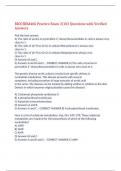
-
BIOCHEM406 Practice Exam 3|103 Questions with Verified Answers,100% CORRECT
- Exam (elaborations) • 32 pages • 2024
-
- $11.49
- + learn more
BIOCHEM406 Practice Exam 3|103 Questions with Verified Answers Pick the best answer. A) The ratio of purine to pyrimidine 2 ́-deoxyribonucleotides in cells is always very close to 1. B) The ratio of (A+T) to (G+C) in cellular RNA polymers is always very close to 1. C) The ratio of (A+T) to (G+C) in cellular DNApolymersis always very close to 1. D) Answers B and C. E) Answers A and B and C. - CORRECT ANSWER A) The ratio of purine to pyrimidine 2 ́-deoxyribonucleotides in cells is alwa...

-
Exp 6 friedel crafts acylation
- Class notes • 7 pages • 2024
-
- $7.99
- + learn more
Friedel-Crafts acylation is a classic organic reaction used to introduce an acyl group onto an aromatic ring. Here's a general overview of the Friedel-Crafts acylation experiment: Objective: To perform a Friedel-Crafts acylation reaction and synthesize an aromatic ketone. Materials: Aromatic compound (typically benzene or a substituted benzene derivative) Acylating agent (commonly acetyl chloride or benzoyl chloride) Lewis acid catalyst (usually aluminum chloride, AlCl₃) Solvent (...
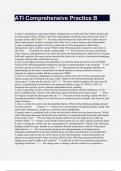
-
Paper 2 Chemistry Get a hint
- Exam (elaborations) • 11 pages • 2023
-
Available in package deal
-
- $14.45
- + learn more
Activation energy >>>>The minimum amount of kinetic energy particles need to react. Amino acids in acidic conditions >>>>Amino acid is fully protonated i.e. (-NH3+) and (-COOH) Amino acids in basic conditions >>>>Amino acid is fully deprotonated i.e. (-COO(-)) and (-NH2) Carbons next to what type of atoms will have a higher chemical shift >>>>electrochemical Conditions for acylation >>>>-heat under reflux -non aqueous solvent DR...

-
A* GRADE AQA A-Level Chemistry: Organic - Aromatic Chemistry (3.3.10)
- Summary • 2 pages • 2023
-
Available in package deal
-
- $3.93
- + learn more
I achieved a high A* Grade in my final A-Level exams using these notes!!! I believe you can achieve an A* if you can memorise these notes! Simply use blurting, a method of active recall, to write everything you remember from the notes, then identify the parts you couldn’t remember, then repeat until you can remember it all! If you can do that, you’ve got an A* in the bag! They are clear, concise, and are laid out according to the specification; there is no information missing or in excess...
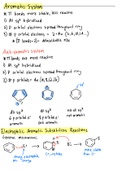
-
Chapter 10 CHEM 210 Summary
- Summary • 6 pages • 2022
-
- $3.99
- + learn more
This study guide will help you succeed on the parts of the final exam containing chapter 10 content. It is a summary of chapter 10 content containing colorful diagrams, drawings, and mechanisms. This study guide paired with practice problems will help any student succeed in this course. The study guide contains information from chapter 10 including: -Aromatic systems vs anti-aromatic systems vs neither -EAS reactions (Halogenation, nitration, sulfonation) -Friedel-Crafts alkylation and acyl...
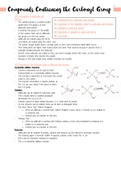

-
AQA A-Level Chemistry 3.8 Aldehydes and Ketones and 3.9 Carboxylic Acids and Derivatives
- Summary • 5 pages • 2022
-
Available in package deal
-
- $3.93
- + learn more
These are detailed Revision Notes for Topic 3.7 and 3.8 of AQA A-Level Chemistry (Aldehydes, Ketones, Carboxylic acids and derivatives). They were written by me using a combination of the textbook and class notes. I will also be uploading the other topics and creating bundles. Topics Included: - Introduction to aldehydes and ketones - Reactions of the carbonyl group in aldehydes and ketones - Carboxylic acids and esters - Reactions of carboxylic acids and esters - Acylation
One of the best hand written notes and supervised by Doctor PhD Irfan sir.
structure of benzene, resonance, electrophilic substitutions, mechanism of nitration, friedal craft alkylation, friedal craft acylation, halogenation, benzene preparation by decarboxylation.
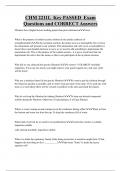
-
CHM 2211L Key PASSED Exam Questions and CORRECT Answers
- Exam (elaborations) • 15 pages • 2024
-
- $10.99
- + learn more
Mixtures have (higher/lower) melting points than pure substanceslower What is the purpose of sodium acetate solution in the amide synthesis of acetophenetidin?In the acylation reaction, the amine acts as a nucleophile, but we have the ammonium salt present in our solution. This ammonium salt can't act as a nucleophile (it doesn't have non-bonded electrons to use), so we need to add something to deprotonate the ammonium salt. This is the purpose of the sodium acetate - it is just a wea...
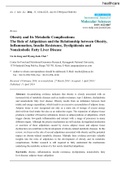
-
Obesity and Its Metabolic Complications: The Role of Adipokines and the Relationship between Obesity, Inflammation, Insulin Resistance, Dyslipidemia and Nonalcoholic Fatty Liver Disease
- Other • 40 pages • 2022
-
- $10.49
- + learn more
Abstract: Accumulating evidence indicates that obesity is closely associated with an increased risk of metabolic diseases such as insulin resistance, type 2 diabetes, dyslipidemia and nonalcoholic fatty liver disease. Obesity results from an imbalance between food intake and energy expenditure, which leads to an excessive accumulation of adipose tissue. Adipose tissue is now recognized not only as a main site of storage of excess energy derived from food intake but also as an endocrine orga...

How did he do that? By selling his study resources on Stuvia. Try it yourself! Discover all about earning on Stuvia



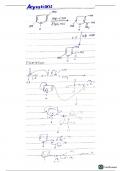
![Benzene And It's Reactivity [organic chemistry]](/docpics/6277400/66f577ea6e59a_6277400_121_171.jpeg)